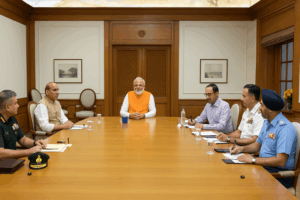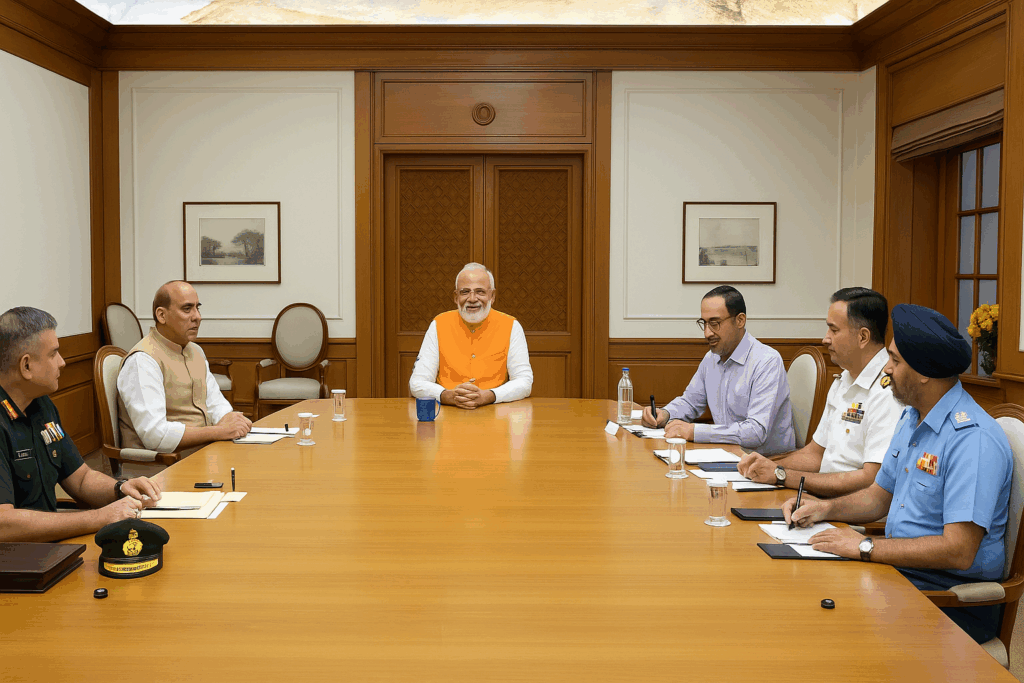Pahalgam Terror Attack: PM Modi Leads High-Level Response as Kashmir Reels from Violence
By New Delhi Post Desk, New Delhi:
A deadly terror attack in Baisaran, Pahalgam, on April 22, 2025, has triggered a robust response from the Indian government, with Prime Minister Narendra Modi chairing a high-level meeting in New Delhi on April 29. The attack, which claimed several lives, including six Maharashtra natives, has led to heightened security measures across Jammu and Kashmir, with 48 tourist sites temporarily closed. The Union Home Ministry also convened a meeting with top security officials, while authorities initiated mock drills and announced deportations of Pakistani nationals. Amidst the turmoil, spontaneous protests by locals, including significant Muslim participation, signal a strong anti-terrorism sentiment in the region.
High-Level Meetings Address Security Crisis
Prime Minister Modi met with Defence Minister Rajnath Singh, National Security Advisor Ajit Doval, Chief of Defence Staff Anil Chauhan, and the chiefs of the Army, Navy, and Air Force to assess the situation and strategize a response. Earlier, the Union Home Ministry held discussions with the heads of the Border Security Force (BSF), Central Reserve Police Force (CRPF), and National Security Guard (NSG) to bolster security protocols. The government’s swift action underscores the gravity of the attack, which targeted tourists in the scenic Pahalgam region, a popular destination in Jammu and Kashmir.
Maharashtra Announces Relief for Victims
Maharashtra Chief Minister Devendra Fadnavis announced significant relief measures for the families of the six state natives killed in the attack. The state government will provide ₹50 lakh in compensation to each family and offer government jobs to immediate family members where there is no earning member. “Our government is committed to supporting the families affected by this tragedy,” Fadnavis said, following a cabinet meeting on April 29.
Security Drills and Deportation Measures
In response to the attack, the National Security Guard (NSG) and Jammu police conducted a mock security drill at the Aap Shambhu temple complex and nearby areas in Jammu. The exercise, supported by advanced surveillance systems, aimed to enhance coordination among security agencies and prepare for potential threats. A police officer described the drill as a routine measure, noting similar exercises at other vital installations like hospitals and railway stations.
Meanwhile, the Jammu and Kashmir administration has initiated the deportation of 60 Pakistani nationals, including Shameema Akhtar, the mother of Shaurya Chakra awardee Constable Mudasir Ahmad Shaikh, who was killed in a 2022 terror attack. The move has sparked debate, with PDP chief Mehbooba Mufti urging the Home Ministry to reconsider, arguing that many of these women, married to Indian citizens for decades, identify as Indians. “They have never acted against the country,” Mufti said, advocating for a sympathetic approach.
Spontaneous Protests Reflect Anti-Terror Sentiment
In a significant development, Democratic Progressive Azad Party President Ghulam Nabi Azad highlighted the organic protests across Jammu and Kashmir condemning the attack. Unlike past leader-driven demonstrations, these protests saw large-scale participation from the Muslim community, signaling a shift in public sentiment. “For the first time, I have seen such an anti-terrorist environment in Kashmir among Muslims,” Azad noted, lamenting the lack of media coverage that could have amplified this message globally.
Political Reactions and Controversies
The attack has also sparked political debates. Former Chhattisgarh CM Bhupesh Baghel called for a special Parliament session to address the security lapse, emphasizing the opposition’s support for the government’s anti-terrorism efforts. Karnataka Minister Dinesh Gundu Rao defended the Congress party’s “Gayab” jibe at PM Modi, urging the Prime Minister to address the nation directly. Meanwhile, a viral video of a zipline operator chanting “Allahu Akbar” and firing gunshots in Pahalgam, along with controversial remarks by Pakistani figures like Shahid Afridi, has fueled tensions and counter-responses from Indian leaders like AIMIM chief Asaduddin Owaisi.
Rising Concerns Beyond Kashmir
The attack’s ripple effects have reached other parts of India. In Nagpur, a Jammu and Kashmir student from Doda was allegedly thrashed by locals, prompting the J&K Students Association to seek intervention from Maharashtra CM Fadnavis. The incident highlights the broader societal tensions triggered by the Pahalgam attack, with authorities urged to address such hate crimes swiftly.
As Jammu and Kashmir grapples with the aftermath of the attack, the government’s multi-pronged response—ranging from high-level security meetings to financial relief and public safety measures—reflects its determination to restore stability. The spontaneous protests and calls for unity against terrorism offer a glimmer of hope amidst the tragedy.



